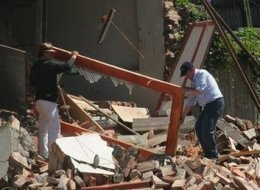
The US Geological Survey says eight Haitian cities and towns – including the capital of 3 million people– suffered "violent" to "extreme" shaking in the 7-magnitude quake, which Haiti's government estimates killed some 220,000 people. Chile's death toll was in the hundreds.
By contrast, no Chilean urban area suffered more than "severe" shaking – the third most serious level – Saturday in its 8.8-magnitude disaster, by USGS measure. The quake was centered 200 miles (325 km) away from Chile's capital and largest city, Santiago.
The earthquake in Chile was far stronger than the one that struck Haiti last month, yet the death toll in Haiti is much higher. Why did this happen? The reasons are simple. Chile is wealthier and much better prepared, with strict building codes, robust emergency response and a long history of handling seismic catastrophes. In contrast, Haiti has never experienced such a major earthquake before, and thus were not prepared for such a major disaster.
Research also shows that the Chilean quake was centered offshore an estimated 21 miles (34 km) underground in a relatively unpopulated area while Haiti's tectonic mayhem struck closer to the surface – about 8 miles (13 km) – and right on the edge of Port-au-Prince, factors that increased its destructiveness.
Based on these information, we can conclude that being preapared to face an earthquake is very important. Many lives can be saved, just like the Chilean example.


